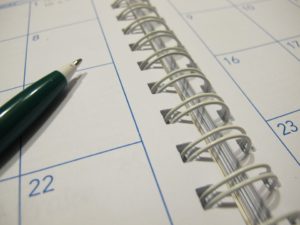“We are what we repeatedly do. Excellence then, is not an act, but a habit” Aristotle
Our lives are the culmination of what we do day in and day out. We all have certain habits we would like to break and there are other actions we would love to see more often in our lives. Stop smoking, start exercising, wake up earlier, go to sleep earlier, watch less television…The list is endless.
How do we change the direction of our lives? How do we form new habits and stick with them when we have the inertia of all our past?
There are a few key things that you can do to help you form new habits that will eventually help you reach your goals and begin living the life you want.
Keystone Habits
The first thing you need to consider is what habit do you want to form. Not all habits are created equal. Think about making out a ToDo list of everything that you want to accomplish in a day. You may have items on that list like cleaning your house, grocery shopping and finishing a presentation for work. Obviously some of the items on your list are more important than others. For each of those items there are consequences if they do not get done. If you don’t clean the house you may not be able to find things. If you don’t pick up food you may not have anything to eat. If you don’t finish the presentation you don’t get the deal. We consciously and subconsciously prioritize the things we try to get done in a day. Sometimes we use unimportant things to procrastinate the more important things all in the name of staying too busy to get everything done. When it comes to habits, certain ones are more important than others. Author Charles Duhigg, in his book “The Power of Habit” calls these habits keystone habits.
Keystone habits are associated with other positive changes in your life. By forming one of the keystone habits you are more likely to form other habits around the keystone habit. The results then are synergistic and you see more positive change than if you were to just form one of these habits on its own. They spark chain reactions that reach into other aspects of your life. Some keystone habits include…
Family Dinner

Gathering your family around the dinner table every night may seem small, but it has a big impact. As Duhigg writes, “Families who habitually eat dinner together seem to raise children with better homework skills, higher grades, greater emotional control, and more confidence.”
Excercise

Exercise triggers people to start eating better. People who exercise have increased patience, less stress, and are more productive at work. Moreover, according to the Association for Applied Sport Psychology, exercise is correlated with better mood, less stress, more confidence, and better sleep.
Make Your Bed

I know what you are thinking. Why make your bed when you are just going to mess it up again tonight. Making your bed is correlated with increased productivity, a greater sense of well-being, and better budgeting skills, Duhigg writes. “Bed makers are also more likely to like their jobs, own a home, exercise regularly, and feel well rested,” Psychology Today report.
Duhigg cites a 2009 study by the National Institutes of Health in which participants with food journals lost twice as much weight as those without.
Food Journal

Why? They began noticing routines in their eating habits, like that they would eat regularly at one specific time. Participants would keep a snack, like an apple or banana, handy during those times, Duhigg writes. It allowed them to plan for a healthy snack in advance.
The food journaling “created a structure that helped other habits to flourish,” Duhigg says.
Daily Routine

Whether it’s getting to bed at the same time every night or following a regular morning routine, having consistency in your day produces a cascade of positive effects. “The way we organize our thoughts and work routines has enormous impacts on our health, productivity, financial security, and happiness,” Duhigg writes.
Meditation or Prayer
A morning meditation could help put your mind at ease for the rest of the day. Plus, meditating has been shown to provide health benefits like reduced blood pressure and a stronger immune system. Furthermore, meditation is correlated with increased memory and awareness, reduced stress and anxiety, and increased goal-setting.
Planning your Day
Taking just a few minutes to sit down and plan out your day can help you focus on the most important tasks to tackle for the day. Taking this time can also give you a chance to set aside time to work on your other habits.
Working on Will Power
Dozens of studies show that willpower is the single most important keystone habit for individual success. It all comes down to self-discipline. How do you know if you have it? One way to measure self-discipline, Duhigg writes, is to put people in a room with cookies and radishes and assign them one of the foods. Those who eat the other food, which will likely be the cookie, aren’t using their willpower. He cites a 2005 University of Pennsylvania study that says students with high self-discipline perform better than those with a high IQ. “They had fewer absences and spent less time watching television and more hours on homework,” Duhigg writes.
One Step at a Time

Once you have decided which habit you want to start with the next step is to work on that habit and that habit only. Multitasking is all the rage. We all seem to think that getting more done requires working on multiple things all at once. The truth is, we are terrible multitaskers and when we try to do too much we actually get less done. Now if you start with a keystone habit other positive effects may start to spill over but you only want to work on one habit at a time. Imagine trying to start all of the keystone habits listed above at the same time. You may be able to stick with it for a few days but the overall routine is too much. None of the actions are established as habits. By dividing your attention and focus onto multiple changes at once it will take longer for each to become established. The longer it takes to establish these actions as habits the more chance there is for slip ups or outright abandonment of the actions.
Start Small
It is perfectly alright to think big. We all have dreams and aspirations. Big dreams are more motivating and give you something to work towards. The challenge comes from bridging where you are now to that future dream state. Say you want to start exercising. The end goal may be for you to lose fifty pounds, become totally ripped and run a marathon. That is great but it is going to take time. Start with building the habit that will get you there. Break it down into one simple action you can take daily that will not take too much of your time. Do ten push-ups or walk for five minutes. Then make sure you do it everyday. Once the habit of “exercising” starts to form do a little more. Increase it to twenty push-ups or throughout the day do ten here and there. Breaking it up into smaller actions makes it easier to stick to it. It takes less will power and it also begins to put you into a real habit that will persist.
Stick to it
How long does it take for a new habit to become an old habit? Some say twenty one days while other research suggests it takes much longer, sometimes over 200 days. There are apps available to track your progress like Habit Bull and Way of Life. Just the act of tracking your progress can make you more likely to stick to it. Jerry Seinfeld used a similar method before we had apps for everything. He would put a large yearly calendar on the wall and make a point of writing everyday. With each day he would mark it off. after a few days he would have a chain of success. The goal then becomes to not break the chain. Seeing a long string of unbroken chain can push you to work on your habit even when you just aren’t feeling it for the day.
Conclusion
So that is all there is to it. Pick a keystone habit, start small and stick to it until it really is a habit. Rinse, Wash, repeat. Before long you will have eliminated all your bad habits and replaced them with positive ones. Just kidding, but with steady work you can begin to change the direction of your life and make some positive changes.
What other methods have you used to form new habits? Leave your comments below.
